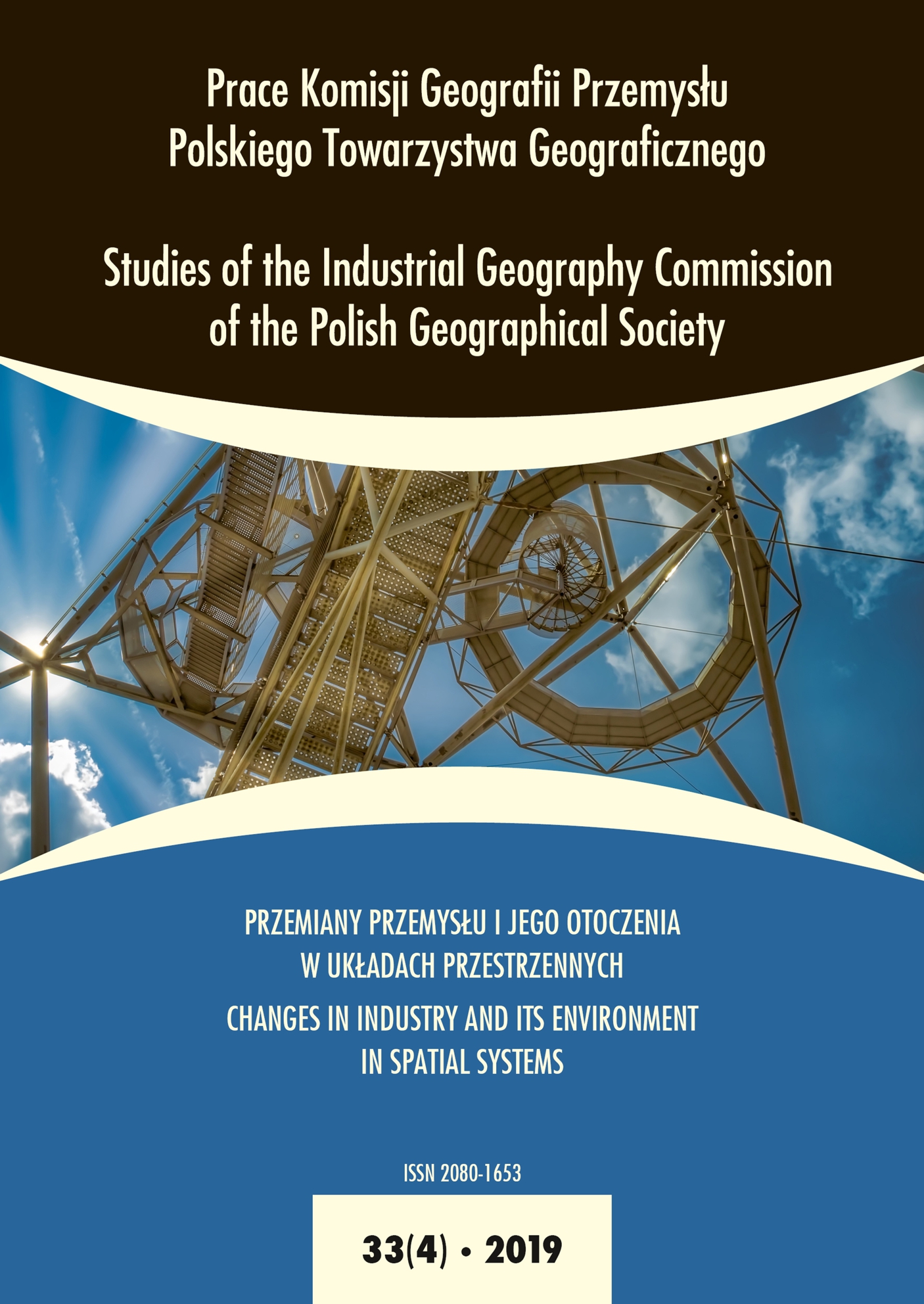Industry in Seaports in the Baltic Sea Region
DOI:
https://doi.org/10.24917/20801653.334.5Keywords:
Baltic Sea Region, industrial ports, industry in seaports, seaportsAbstract
: The article refers to research on the industrialisation of ports. Nowadays, apart from the offshore industry, this topic was not discussed in more detail in the literature. The aim of the study was to check the structure of production plants not closely related to maritime economy which operate in seaports of the Baltic Sea Region and to evaluate the role of maritime transport in servicing individual plants. The analysis excluded maritime construction and shipbuilding (production and repair yards), as well as fishing ports due to their specificity in production. The research area covered the Baltic Sea Region understood as 9 countries: Germany, Poland, Lithuania, Latvia, Estonia, Russia, Finland, Sweden, Denmark.
We can distinguish industrial ports that are part of commercial ports or independent ports that are an important link in the industrial production chain. There were about 270 transhipment ports in the study area, two fifths of which were of industrial importance. The types of industry appearing in the surveyed port centres, as well as the conditions of using ports for the needs of industrial plants located in them were characterised. In the structure of the identified plants, the largest group was the wood and paper industry, a significant number of plants also represented the following industries: energy, mineral and metallurgy. Access to maritime transport is crucial for the fuel and energy sector - it was the only or main route for the supply of raw materials for production for a part of refineries and power plants.
Downloads
Metrics
References
Adrjanowska, E. (1977). Morze jako czynnik lokalizacji przemysłu. Zeszyty Naukowe Wydziału Biologii i Nauk o Ziemi Uniwersytetu Gdańskiego, Geografia, 7.
Akzo Nobel (2018, 1 sierpnia). Pozyskano z https://www.akzonobel.com/
ArcelorMittal (2018, 1 października). Pozyskano z https://germany.arcelormittal.com/
Balcewicz, J. (2015). W cieniu dawnej elektrowni jądrowej, tam gdzie Gazociąg Północy wychodzi z morza na ląd. Energia Gigawat, 7. Pozyskano z http://gigawat.info/artykul/items/w-cieniu-dawnej-elektrowni-jadrowej-tam-gdzie-gazociag-polnocy-wychodzi-z-morza-na-lad.html
Baltic Bulk Map 2012 (b.d.). Baltic Transport Journal, Gdynia: Baltic Press.
Bird, J., (1973). Centrality and Cities. Routledge Taylor and Francis Group: London, 1–23.
Bocheński, T. (2019). Porty morskie w krajach nadbałtyckich. W: A. Cedro (red.). Polska geografia morza. Przyrodnicze i społeczno-ekonomiczne badania morza i obszarów nadmorskich. Szczecin: Volumina, 125–146.
Boulos, J. (2015). Sustainable Development of Coastal Cities-Proposal of a Modelling Framework to Achieve Sustainable City-Port Connectivity. Procedia – Social and Behavioral Sciences, 216, 974–985. doi: 10.1016/j.sbspro.2015.12.094
Denmark to be Coal-Free by 2030 (2017, 16 listopada), State of Green. Pozyskano z https://stateofgreen.com/en/partners/state-of-green/news/denmark-to-be-coal-free-by-2030/
Denmark: Shell Frederica Refinery Sold to Dansk Olieselskab ApS (2016, 16 września). Pozyskano z https://www.petrolworld.com/europe/item/25883-denmark-shell-frederica-refinery-sold-to-dansk-olieselskab-aps
Dutkowski, M. (1983). Polaryzacja przestrzeni miejskiej aglomeracji gdańskiej. Maszynopis rozprawy doktorskiej. Gdynia: Wydział Biologii i Nauk o Ziemi Uniwersytetu Gdańskiego.
Equinor Refinning Denmark A/S (2018, 1 października). Pozyskano z https://www.equinor.com/en/where-we-are/denmark.html
ESPON Baltic Sea Region (2018, 28 listopada). Pozyskano z http://bsr.espon.eu/opencms/opencms/Gallery/BSR-Background-Maps.html
European Union Strategy for the Baltic Sea Region (2009, 10 czerwca). Communication from the Commission to the European Parliament, The Council, The European Economic and Social Committee and the Committee of the Regions, COM(2009) 248 final, Brussels.
FN Steel (2018, 1 sierpnia). Pozyskano z https://www.fnsteel.eu/
Google Maps (2018, 2 stycznia). Pozyskano z https://www.google.pl
Groupe Vivescia Malteurop (2018, 1 października). Pozyskano z https://pl.malteurop.com/
Grzelakowski, A.S. (2017). Porty morskie jako przedmiot badań w naukach ekonomicznych.
Problemy Transportu i Logistyki, 1(37), 161–169. doi: 10.18276/ptl.2017.37-26
Hoyle, B.S. (1998). Citiesand ports: conceptsand issues. Journal of Vegueta, 3, 263–278.
Jamroż, M. (2013, 17 czerwca). Historia gdańskiego Lotosu. Dodatek do „Gazety Wyborczej”.
Jezierski, G. (2004, 26 maja). Energetyka jądrowa w Szwecji. Najlepsza w surowym klimacie.
Gigawat Energia. Pozyskano z http://gigawat.net.pl/article/articleprint/360/-1/41/
Klopott, M. (b.d.). The Baltic Sea as a model region for green ports and maritime transport. Gdynia–Tallin: Baltic Port Organization.
Koselnik, B. (1960). Niektóre problemy industrializacji polskich portów morskich. Szczecin, 4–5, 48–51.
Kuźma, L. (1968). Ekonomika portów morskich. Sopot: Wydawnictwo Wyższej Szkoły Ekonomicznej.
Kuźma, L., Sczepaniak, T. (1971). Porty morskie. Gdańsk: Wydawnictwo Morskie.
Lantmännen (2018, 1 października). Pozyskano z https://lantmannen.com/om- lantmannen/organization-och-verksamhet/
Liepaja Special Economic Zone (2019, 1 czerwca). Pozyskano z https://liepaja-sez.lv/en/lsez/teritorija
Niemcy rezygnują z elektrowni atomowych (2003, 15 listopada). Pozyskano z https://www.rmf24.pl/nauka/news-niemcy-rezygnuja-z-elektrowni-atomowych,nId,109685
Norcliffe, G., Basset, K., Hoare, T. (1996). The emergence of postmodernism on the urban waterfront. Geographical perspectives on changing relationships. Journal of Transport Geography, 4(2), 123–134.
Nordkalk (2018, 1 sierpnia). Pozyskano z http://www.nordkalk.pl/kontakt/lokalizacje/Ruotsi/
Nordregio (2018, 28 listopada). Pozyskano z http://archive.nordregio.se/en/Metameny/AboutNordregio/Modules-About-Nordregio/Geographical-scope-we-cover/Baltic-Sea-Region/index.html
NPM Silmet (2019, 1 czerwca). City of Sillmäe. Pozyskano z http://www.sillmae.ee/web/eng/molycorp-silmet
Open Street Map (2018, 2 stycznia). Pozyskano z https://www.openstreetmap.org
Orlen Lietuva (2018, 1 października). Pozyskano z https://www.orlenlietuva.lt/EN/Company/Ol/Pages/Terminal-and-Pipelines.aspx
Palmowski, T. (2013). Kaliningrad – szansa czy zagrożenie dla Europy Bałtyckiej. Gdańsk-Pelplin:Uniwersytet Gdański i Wydawnictwo Bernardinum.
Palmowski, T. (2017). Baltic Europe – 40 years of integration. Studia Regionalia, 52, 41–57.
Piskozub, A. (1982). Przesłanki teoretyczne lokalizacji przemysłu w aglomeracjach portowych. W: A. Piskozub (red.). Przemysł w aglomeracjach portowych Polski. Gdańsk: Wydawnictwo Morskie, 9–52.
Russu, C. (2015). Industrial specialization of the European Union member countries. Economic Insights – Trends and Challenges, IV(LXVII), 63–73.
SSAB (2018, 1 sierpnia). Pozyskano z https://www.ssab.com/company/about-ssab/our-business/ssab-europe
Wiegmans, B.W., Louw, E. (2011). Changing port–city relations at Amsterdam: A new phase at the interface? Journal of Transport Geography, 19, 575–583.
VASAB (2019, 1 czerwca). Pozyskano z https://vasab.org/
Ventspils Free Port (2019, 1 czerwca). Pozyskano z http://www.portofventspils.lv/en/invest-inventspils/industrial-clients/
VK Terminal (2019, 1 czerwca). Pozyskano z http://www.vktranzits.lv/en/venta/services/
Zaremba, P. (1962). Urbanistyka miast portowych. Szczecin.
Downloads
Published
How to Cite
Issue
Section
License
Articles are published under the terms of the Creative Commons License (CC BY-ND 4.0; Attribution– NoDerivs).

